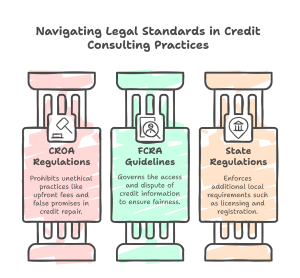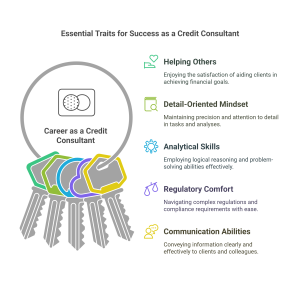Introduction
Are you considering a career where you can make a real difference in people’s financial lives while enjoying flexibility and impressive earning potential? Becoming a board-certified credit consultant might be your perfect next move. Whether you’re a financial advisor looking to expand your credentials, a small business owner seeking to add complementary services, or already working in credit repair without formal certification, this guide will walk you through everything you need to know about gaining this valuable credential.
In today’s economy, with 30% of Americans struggling with subprime credit scores, qualified credit consultants are in high demand. Let’s explore how you can join this rewarding profession and help clients rebuild their financial futures.
What Is a Board-Certified Credit Consultant?
Before diving into the “how,” let’s clarify what being a board certified credit consultant actually means.
A board-certified credit consultant is a professional who has received formal recognition from a credible accrediting organization, confirming their expertise in credit counseling, credit repair strategies, consumer protection laws, and ethical practices. This certification demonstrates to potential clients that you possess the knowledge and skills to effectively help them improve their credit and financial standing.
Unlike general financial advisors, certified credit consultants specialize specifically in credit-related matters, from disputing inaccurate information on credit reports to developing strategies for rebuilding credit scores.
Why Certification Matters
![Insert image of a professional receiving a certificate]
You might be wondering: “Is certification actually necessary?” While technically not required by law in all states, becoming board-certified offers several significant advantages:
- Enhanced credibility with potential clients who are entrusting you with their financial futures
- Legal compliance with federal regulations like the Credit Repair Organizations Act (CROA)
- Professional recognition within the financial services industry
- Access to resources and continuing education opportunities
- Higher earning potential compared to non-certified consultants
Jessica Carter, a credit repair specialist who recently obtained her certification, shares: “Getting certified completely transformed my business. Not only did my client base grow by 40% within six months, but I was able to charge premium rates for my services because clients recognized the value of working with a certified professional.”
Major Certification Providers
In the United States, several respected organizations offer certification programs for credit consultants. The most prominent include:
| Organization | Program Features | Approximate Cost | Duration |
| Credit Consultants Association (CCA) | Comprehensive curriculum, online and in-person options, ongoing support | $800-$1,200 | 6-8 weeks |
| American Credit Repair Academy (ACRA) | Self-paced option, extensive credit law coverage, business startup guidance | $500-$1,000 | 4-12 weeks |
| National Association of Certified Credit Counselors (NAC) | Specialized tracks, robust ethical training, recognized nationwide | $1,000-$1,500 | 8-12 weeks |
Each organization has its own specific requirements and focuses, so it’s worth researching which one best aligns with your career goals and learning preferences.
Step-by-Step Path to Certification
1. Research and Choose a Certification Program
Start by thoroughly investigating the certification programs available. Consider factors such as:
- Accreditation status of the organization
- Course curriculum and learning outcomes
- Program flexibility (online vs. in-person, self-paced vs. scheduled)
- Cost and payment options
- Graduate reviews and success stories
Michael Thompson, a real estate agent who expanded his business to include credit consulting, advises: “Don’t just go with the cheapest option. I initially made that mistake and ended up switching programs. Look for comprehensive training that covers not just the technical aspects of credit repair but also business operations and ethical considerations.”
2. Complete Required Training
Most certification programs include rigorous training that covers:
- Credit report analysis and dispute procedures
- Federal laws, including the Fair Credit Reporting Act (FCRA) and Credit Repair Organizations Act (CROA)
- Credit scoring models and improvement strategies
- Ethical standards and best practices
- Business operations and client management
Training formats vary from self-paced online courses to virtual instructor-led classes or in-person workshops. Choose the format that best suits your learning style and schedule constraints.
3. Pass the Certification Exam
After completing your training, you’ll need to pass a comprehensive examination. Most certification exams cover:
- Credit law knowledge and regulatory compliance
- Practical credit repair techniques
- Ethical scenarios and Appropriate Responses
- Business operations and client communication
Exams typically consist of multiple-choice questions, case studies, and sometimes practical demonstrations of skills. Many programs offer practice exams to help you prepare.
4. Fulfill Additional Requirements
Depending on the certification provider, you may need to:
- Submit proof of completed coursework
- Provide professional references
- Sign a code of ethics pledge
- Complete a background check
- Purchase professional liability insurance
These additional steps help ensure that certified consultants meet high professional standards.
5. Maintain Your Certification
![Insert image of a professional attending a continuing education seminar]
Certification isn’t a one-time achievement—it requires ongoing maintenance. Most certifying organizations require:
- Annual membership renewal
- Continuing education credits (typically 10-20 hours annually)
- Adherence to updated ethical standards
- Periodic recertification (usually every 2-3 years)
Sarah Johnson, a financial advisor who added credit consulting to her service offerings, notes: “The continuing education requirement initially seemed burdensome, but it’s actually been invaluable. Credit laws and best practices change frequently, and staying current has helped me provide better service to my clients.”
Legal Considerations
While certification demonstrates your expertise, it’s important to understand the legal framework governing credit consulting:
- The Credit Repair Organizations Act (CROA) prohibits certain practices, such as charging upfront fees or making false promises
- The Fair Credit Reporting Act (FCRA) governs how credit information can be accessed and disputed
- State-specific regulations may require additional licensing, bonding, or registration
According to the Federal Trade Commission, compliance with these regulations is essential for legal operation. Certification programs typically include detailed coverage of these laws to help you stay compliant.

Building Your Credit Consulting Business
Once certified, you have several options for putting your credentials to work:
1. Start Your Own Practice
Many certified consultants choose to start their own businesses, offering services directly to clients. This approach provides maximum flexibility and earning potential.
To launch successfully:
- Develop a clear business plan
- Create a professional website and marketing materials
- Establish service packages and pricing
- Build referral networks with related professionals (mortgage brokers, real estate agents, etc.)
- Implement secure systems for handling sensitive client information
2. Join an Existing Firm
Alternatively, you might join an established credit repair company or financial services firm. This option provides immediate access to clients and infrastructure, though typically with lower earning potential than independent practice.
3. Add Credit Consulting to Existing Services
If you’re already in a related field like financial advising, mortgage lending, or real estate, adding credit consulting services can enhance your current offerings and create additional revenue streams.
Income Potential
One of the most common questions aspiring credit consultants ask is: “How much can I earn?” While individual results vary based on factors like location, business model, and client volume, here’s what you can generally expect:
- Entry-level certified consultants: $40,000-$60,000 annually
- Established consultants: $60,000-$85,000 annually
- Top performers with established practices: $85,000-$100,000+ annually
Many consultants charge either monthly retainer fees ($75-$150 per month per client) or package rates ($500-$1,500 per comprehensive credit repair package).
Is This Career Right for You?
Becoming a board-certified credit consultant is an excellent career choice if you:
- Enjoy helping others achieve financial goals
- Have a detail-oriented mindset
- Possess strong analytical skills
- Are comfortable with regulations and compliance
- Have good communication abilities
- Value work flexibility and independence

Conclusion
Becoming a board-certified credit consultant offers a meaningful career path with significant growth potential. By investing in proper certification, you’ll gain the knowledge, skills, and credibility needed to help clients transform their financial lives while building a rewarding business for yourself.
Ready to take the next step? Research certification providers, compare their offerings, and choose the program that best aligns with your career goals. Within months, you could be launching your new career as a certified credit consultant, making a real difference in people’s financial futures.
Have you considered pursuing certification in the financial services industry? Share your thoughts or questions in the comments below!



